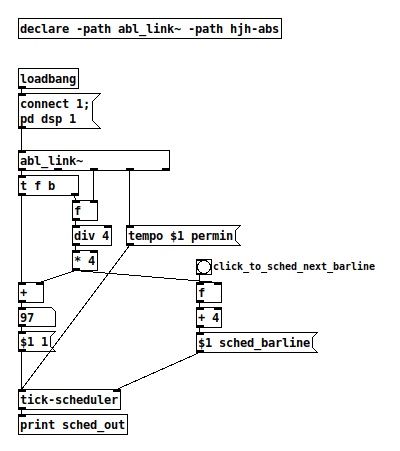@JoshuaACNewman said:
@ddw_music Your concerns are the opposite of those for introducing programming to kids who need to be conceptually literate in a microcontroller-saturated world.
Ohhhhh... I misunderstood the environment, my fault. I think what I said would make sense at college level, but definitely, for kids, not Java. NOT Java.
(Actually, if it's up to me, I wouldn't even subject college students to Java. I can hardly think of a better way to turn anyone off from programming.)
If they need hardcore data structures, they'll keep learning new environments and languages...
Yes and no... if the environment doesn't support rich data structures, then you might never know that they exist, and the lack of them can actually restrict the scope of questions you're able to ask. This isn't important at beginning stages, of course, but it's nice to have them around -- "huh... PriorityQueue, what's that about?" (vs Pd where I actually built a scheduler based on the priority-queue implementation from pd-container, and then someone here asked, "Well why do you need that?"  )
)
Right now, we have a society with dangerously low literacy in the machines they use all day every day. Those kids aren't all going to become computer scientists, but unless they learn that machines don't "don't want to work", but instead are following algorithmic processes that might include errors, the world is increasingly mysterious to them.
This, I 100% agree.
One thing I would note here about Pd culture is that it doesn't talk much about algorithms (except jameslo in this forum). When I have asked for resources about programming pedagogy in Pd, or tried to identify general patching patterns that can be applied to a variety of algorithms, that conversation doesn't go very far. When somebody asks e.g. how to iterate over a list, usually the answer is "giving them a fish" rather than "teaching them how to fish."
I suspect a couple of things here. One is the mystique of "it's not really programming -- it's patching" (but somehow it's just as technical and fiddly as programming). The other is perhaps a bit of a feedback loop -- if it's not really good at "standard" algorithmic thinking, then people don't do it as much, meaning its mechanisms remain underdeveloped, and so on.
This is not to say Pd is a bad choice for beginners. But, if the goal is some degree of algorithmic literacy, there's a bit of an uphill climb with patchers. Graphical patching could be excellent for pedagogy, but Max/Pd IMO are not the ideal level of abstraction for this. They both pretend to be high-level while actually requiring a lot of low-level fiddling about.
The gap between "kid languages" like Scratch and, say, Java has to do with pedagogical, philosophical blind spots in computer science, where computer scientists reproduce other computer scientists like themselves. And that means that computer science has entire areas that are underexplored, and things like Pd, SmallTalk, HyperTalk, and even Minecraft show paths not taken, with no guarantee that there are not lush forests of new kinds of understanding down those paths.
FWIW my favorite programming environment is a Smalltalk derivative (SuperCollider).
Also FWIW, I chose Pd for my college-level interactive multimedia class, even though I very much prefer SuperCollider in my own work. At least in this conservatory of music technology department, maybe 1 student per year gets into code, while 4-8 out of 50 might seriously engage with Pd/Max. I would have made my life a lot easier by forcing SuperCollider, but it was worth the effort on my part for more student engagement.
So I do get what you're saying. Students may not need hardcore programming power.
hjh


 )
)
